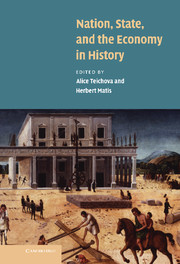Book contents
- Frontmatter
- Contents
- List of figures
- List of tables
- List of contributors
- Acknowledgements
- Introduction
- PART I
- 1 Political structures and grand strategies for the growth of the British economy, 1688–1815
- 2 Economic factors and the building of the French nation-state
- 3 Nation building in Germany: the economic dimension
- 4 The harmony liberal era, 1845–1880: the case of Norway and Sweden
- 5 Nationalism in the epoch of organised capitalism – Norway and Sweden choosing different paths
- 6 Economic development and the problems of national state formation: the case of Spain
- PART II
- PART III
- PART IV
- PART V
- Index
2 - Economic factors and the building of the French nation-state
Published online by Cambridge University Press: 07 September 2009
- Frontmatter
- Contents
- List of figures
- List of tables
- List of contributors
- Acknowledgements
- Introduction
- PART I
- 1 Political structures and grand strategies for the growth of the British economy, 1688–1815
- 2 Economic factors and the building of the French nation-state
- 3 Nation building in Germany: the economic dimension
- 4 The harmony liberal era, 1845–1880: the case of Norway and Sweden
- 5 Nationalism in the epoch of organised capitalism – Norway and Sweden choosing different paths
- 6 Economic development and the problems of national state formation: the case of Spain
- PART II
- PART III
- PART IV
- PART V
- Index
Summary
There is a plentiful literature about the state's role in the history of the French economy and this literature is growing, as this problem is a matter of active controversy, not only among economists and economic historians, but also between politicians, in the ‘chattering classes’ and in the media. Free-marketeers consider the state to be responsible for most past or present ills and shortcomings in the French economy; socialists are convinced that intervention by the state has been and is both necessary and positive in its effects. The name of Colbert is bandied around, and abroad France is seen as a hopelessly Colbertist country.
On the other hand, the problem which is the theme of this volume – the impact of economic change upon the building of the nation-state (it is de facto the reverse of the one which has just been mentioned) – has been neglected, as in other countries, and this chapter will only put forward a number of rather desultory and elementary remarks. Moreover, it will mainly deal with the French state in the late medieval and early modern period, with the building of the ancien régime state. Indeed, I do not share the view that the ‘modern’ nation-state only developed in the era of industrial capitalism, i.e. the nineteenth century. The state, as we understand it, had emerged much earlier in Western Europe.
- Type
- Chapter
- Information
- Nation, State and the Economy in History , pp. 34 - 55Publisher: Cambridge University PressPrint publication year: 2003
- 2
- Cited by

